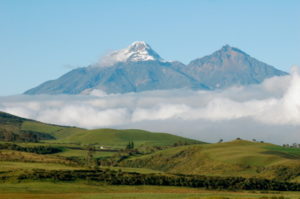For more than 30 years, International Living has been publishing information on retiring overseas. And, every September in the IL magazine, we cover the best countries in the world to retire to.
In IL’s annual Global Retirement Index, we rank the top 23 places in the world to retire — and lay out why they make sense — so you can more easily target the destination that’s right for you. The 23 countries are rated out of 100 points in categories such as real estate prices, cost of living, culture, health care, special benefits for retirees, infrastructure, safety/stability and climate.
Cotopaxi near Quito: You can live well in Ecuador for as little as $600 a month.
No matter where you may choose, the good news is that it’s a lot easier to go abroad today than it was even just 20 years ago. Easier to get there (and get around). Easier to keep in touch. Easier to find the goods and services you’re used to.
See below for the full article on our top retirement havens in 2011, but before you do, sign up for our FREE report which covers our top 10 countries this year in more detail.
Simply enter your e-mail below to subscribe to International Living’s free daily e-letter and we’ll immediately send your free report–International Living’s 2011 Retirement Index–The World’s Top 10 Retirement Havens.
Enter your email address below
And the winner is…
Flowers bloom everywhere, and not one but four rushing rivers bubble over rocks to feed the lush vegetation. In Ecuador—the country that tops this year’s Global Retirement Index—nature is ever-present. And you can enjoy it fully in the city of Cuenca, where those rivers trail amid mountain surrounds.
The colonial churches, grand mansions, shady parks, and fountain-anchored plazas have earned Cuenca world-wide recognition for its beauty. A mild climate makes for comfortable living year-round. Average daily temperatures reach into the 70s F, and the nights are cool and fresh. And Ecuador is one of the most affordable countries in the world. You can rent a furnished, two-bed apartment in an historic center for $220, or buy a large condo for $66,000. You can live well for $600 a month…and like royalty for double that.
To rank our winners this year, we analyzed 37 critical data points for each of our top 23 retirement havens and, for the third year running, Ecuador won. For retirees, colonial Cuenca is Ecuador’s most attractive city. The third largest in the country, it offers the relaxed pace of a smaller town with the first-class amenities and health care of a bigger one. But Cuenca is by no means your only option in Ecuador. This is a country with something for everyone—beaches, rural highlands, jungle escapes, and colonial cities.
“No matter where you choose to live in Ecuador, there is no better place on earth to discover the simple abundance of health, tranquillity, adventure, and beauty,” says expat Patricia Farmer. “We chose Bahía de Caraquez on the coast to begin our Ecuador adventure. There are plenty of amenities, including a hospital, restaurants, and frequent expat get-togethers.”
Patricia, her husband Ron, and their two nervous cats arrived at their new beachfront home in February of this year. “We knew no one. And yet we immediately felt at home,” says Patricia. “Living in Southern California, we were spoiled by the warm climate and beautiful beaches. Retirement would—or should—have given us time to enjoy all that more fully. And yet we had no realistic chance of retiring anywhere near a beach in California. “Looking back now, we’re glad we needed to look elsewhere to fulfil our retirement dreams. Otherwise, the chance of living in one of the most beautiful and exotic retirement havens in the world might have passed us by.”
For Douglas Willis and his wife Lisa, Cuenca became the haven of choice. “We love the fact that Cuenca has preserved its Old-World feel. It has excellent medical facilities, too, and we can find just about anything we need here in the way of shopping,” says Douglas.
Douglas and Lisa have been in Cuenca for four years (read their full story here) and say that the city’s extensive public transportation system makes it easy to live there without a car. Plus, “we’ve been extremely pleased with the quality of the health care offered in Cuenca. In our experience, it is superior in almost every way to the U.S. Doctors here are more accessible and hands-on than doctors in the U.S. They seem to really care about their patients and are very well-trained and qualified. There are a number of new medical facilities in Cuenca that rival anything available in the U.S.,” says Douglas.
But there’s more to Ecuador than affordable beach life and vibrant highland cities. After weighing their options, Jack Moss and his wife Debbie opted for small-town Cotacachi. “We were looking to retire outside of the U.S. after hectic careers. It seemed that Mexico, Costa Rica, and Panama had already had their run. Research pointed us to Ecuador. We read about Cuenca but didn’t want the larger city. And we didn’t want the heat of the beach. We visited the mountain-valley village of Cotacachi three times. On the last visit, we stayed for a month and decided that the tranquillity, the weather, the small expat community, and the low cost of living were what we were looking for.”
Since Ecuador’s official currency is the U.S. dollar, you have no problems determining the cost of goods or services. “Although imported goods are more expensive, local products and labor are quite reasonable,” says Jack. “Our water and sewer bill is about $3 a month, our electric bill is $45 and property tax is $52 a year. Cotacachi’s Sunday market offers a large variety of fresh fruits and vegetables, cheeses, eggs, flowers, etc … all at low prices compared to the U.S.” (For Jack and Debbie’s Cotacachi budget, go here.)

